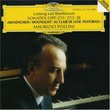| All Artists: Anton Bruckner, Gustav Mahler, Jascha Horenstein, Vienna Symphony Orchestra Title: Horenstein conducts Mahler Symphony No. 1 & Bruckner Symphony No. 9 Members Wishing: 0 Total Copies: 0 Label: Vox (Classical) Release Date: 4/16/1995 Genre: Classical Style: Symphonies Number of Discs: 2 SwapaCD Credits: 2 UPC: 047163550829 |
Search - Anton Bruckner, Gustav Mahler, Jascha Horenstein :: Horenstein conducts Mahler Symphony No. 1 & Bruckner Symphony No. 9
 | Anton Bruckner, Gustav Mahler, Jascha Horenstein Horenstein conducts Mahler Symphony No. 1 & Bruckner Symphony No. 9 Genre: Classical
|
Larger Image |
CD DetailsSimilar CDs
Similarly Requested CDs
|
CD ReviewsTop Notch Mahler and Bruckner for a Song T. Beers | Arlington, Virginia United States | 11/19/2001 (5 out of 5 stars) "Jascha Horenstein (1899-1973) was an incomparable Bruckner and Mahler conductor who, unfortunately, made few commercial recordings. Late in his life he re-recorded the Mahler First and Bruckner Ninth symphonies in stereo, but, as good as those recordings are (on Unicorn and BBC Classics CDs), these earlier performances on Vox are still very special. Yes, the playing is sometimes scrappy and the sound is mono, but Horenstein's intelligent intensity carries all before it. Every element of both scores is projected with amazing clarity, yet there is a palpable sense - at all times - of a transcending "grand line" that shapes the details into completely convincing wholes. And let's not overstate the scrappiness of the playing by the Vienna Symphony. Vox made these recordings on shoestring budgets with next to no opportunity for rehearsal. Given the complexity of these scores, what Horenstein and the orchestra achieved under such conditions is nothing less than miraculous. Sound quality is good for the date (ca. 1955); indeed, in the Bruckner 9th more than good. It is certainly good enough to allow you to hear how great the performances are and to enjoy them as music. And the price is quite spectacular! Playing Mahler and Bruckner in the 1950s was by no means a common thing, and hearing these recordings today captures some of the sense of pioneer excitement that accompanied their original release." An amazing interpretation with scrappy playing and recording Gregory M. Zinkl | Chicago, IL | 07/24/2000 (5 out of 5 stars) "Okay, why is it that your neighborhood amateur orchestras survive? My theory is that you have enthusiastic amateurs, often skilled, often not, who give their all into a performance. Sure, the strings are often out of tune, the woodwinds miss their entrances, and the brass flub left and right, but you don't go there to hear perfect technique; you go there for the music, which can transcend the limits of the performers when presented with enthusiastic magnetism, especially when the podium is bearing a talented, patient leader.The Vienna Symphony was a mighty scrappy bunch when Horenstein made these recordings. But Horenstein was on the podium, and every player believed in him to the last man, or so it sounds. You have not heard Mahler's 1st until you've heard this incredible performance. Forget that the horns can't play in tune at all in the Finale; forgive the strings for their wildly undisciplined playing. It all comes together into a transcendental experience.The Bruckner 9th I can't comment on in detail since I don't know it as well. All I do know is that when I listen to it, gee, it sounds well, short! Yet it gets its own disc, so I assume it is in the ballpark timingwise of other performances, and I enjoy it too. Same comments, btw, about the engineering and the orchestra.The engineering: it's mono. It's not too bad. It doesn't hinder the performance, so I guess it is "open" enough. I rarely buy mono performances, but Horenstein's outings on Vox are an exception I'm almost always happy to make." Be careful! This is very subpar playing in boxy mono Santa Fe Listener | Santa Fe, NM USA | 09/22/2005 (3 out of 5 stars) "HOrenstein is a great musician, but he was stuck in the Vox years with dismal orchestra and very poor mono sound. YOu get both in these two perfomances. I for one couldn't listen to them for all that I admire the conductor."
|

 Track Listings (4) - Disc #1
Track Listings (4) - Disc #1












